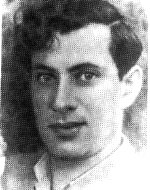Wolinitz, Shmuel
Son of Esther and Moshe Yitzchak. He was born in 1913 in the village of Malaglusha near Pinsk, Poland. In his village he attended a Hebrew school and a branch of the “Tarbut” high school. Samuel was educated in an atmosphere of culture and on the knees of Zionism and Hebrew literature and would go out with his brothers and sisters to work in the field. When he grew up, his parents recommended that he go to his brother to study in the teachers’ seminary there, but he chose Zionist activity and was one of the founders of the Hehalutz and Hehalutz Hatzair movement. Afterward, he spent four years in a training commune in Tarnopol, in the Vrba-Klosova region, and when he was eliminated there he moved to Lodz for another year. In 1938 he emigrated to Eretz Israel and joined Bonnie and the defenders of Ramat Hakovesh. The days were bloody, and one of them was severely injured by a gang of Arab rioters who attacked the car in which she was traveling. He responded with courage and restrained peace: “I have had a hard experience, but I am not deterred, the future is ours.” He was strong and solid, eagerly devoted to farming in the fodder industry and thus had experience from his childhood. After many hours of work he often read until late at night and continued to enrich himself with the treasures of the culture of Israel that he began to absorb as a child. Although he rarely intervened in public affairs, he was aware of all that was happening in society and in the movement. Nevertheless, he devoted his time to his hobbies: playing chess and playing guitar, violin and mandolin. On the morning of November 16, 1943, military vehicles full of armed British soldiers entered Ramat Hakovesh. Soon the kibbutz members were put into pens that the soldiers set up with barbed wire and began to search for weapons, accompanied by turning tents, dispersing objects and uprooting floors. Nothing was found in the searches. The soldiers began to bring the members of the kibbutz to the cars, but they displayed strong resistance and were therefore severely beaten with rifle butts. Fourteen of the wounded were taken to a hospital, among them Shmuel, who lost consciousness. Five days he lay unconscious in a government hospital in Nablus and on the 23rd of Cheshvan 5704 (21.11.1943) died of his wounds. His funeral began in Jerusalem, from the courtyard of the National Institutions, where Moshe Shertok (Sharett) eulogized the Jewish Agency and continued at Ramat Hakovesh. Many people from the surrounding communities came to pay their last respects and near the open grave in the kibbutz cemetery were the main people of the Jewish community: Golda Meir, Avraham Shapira, Yitzhak Tabenkin, Hazani, Yaakov Riftin and Zrubavel. B. Minkowski, who eulogized the name of the agriculture, said, among other things, that “we will bring him to burial next to his comrades who fell in the years of the riots.” The government, which did not know how to prevent the murder of those fallen soldiers, added one more sacrifice to them because we did not want to be abandoned, For us from every side. ” He left a wife and a daughter. On the 30th anniversary of his death, the Jewish National Fund announced the planting of a forest in his name and the name of Ramat Hakovesh, and the great responsiveness of children and youth, notaries and many organizations and institutions expressed the unity of the Yishuv at the time of the test. His name was immortalized in the Haganah and Mapai – “These Days.” A list in his memory was published in HaPoel HaTza’ir.
